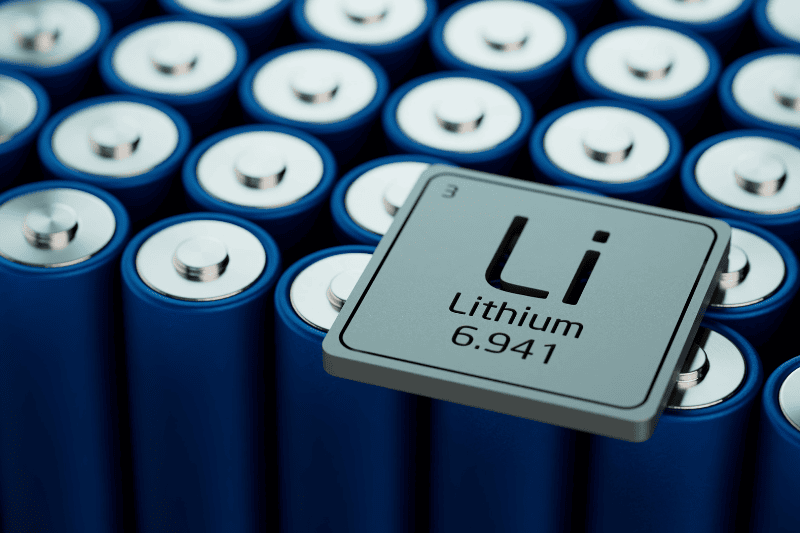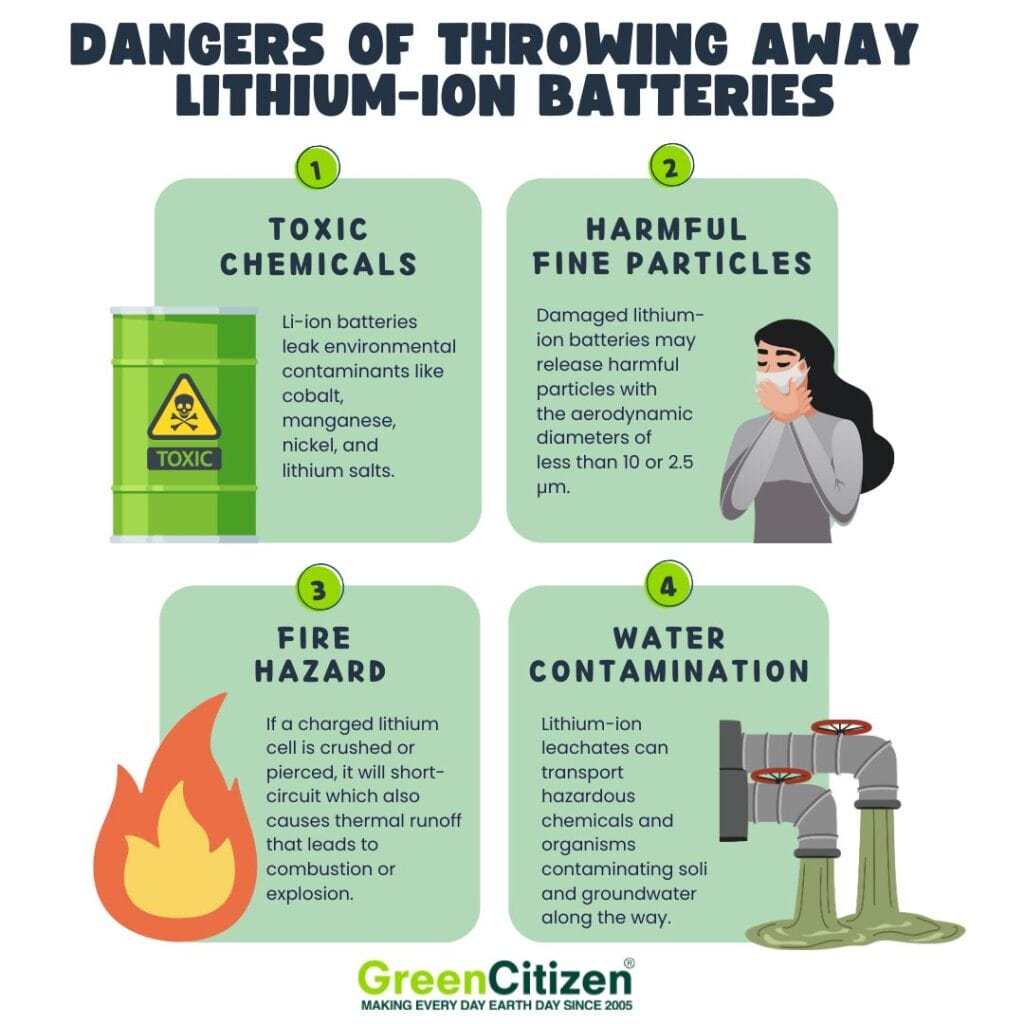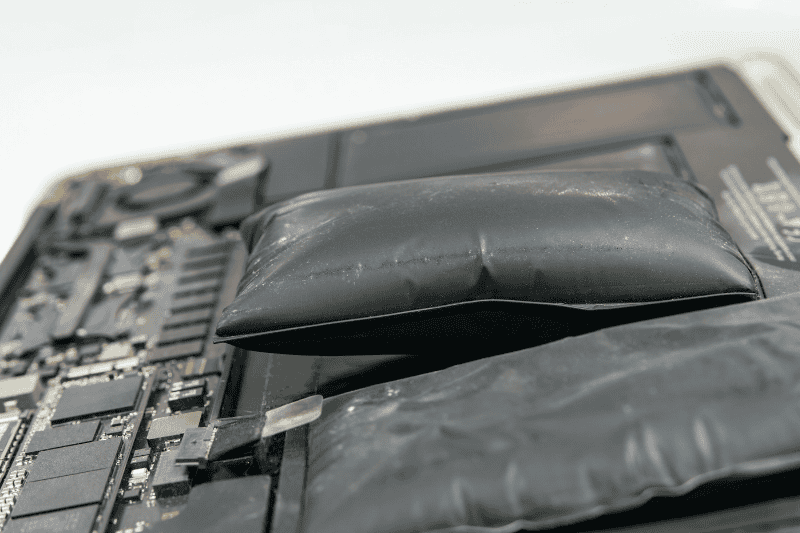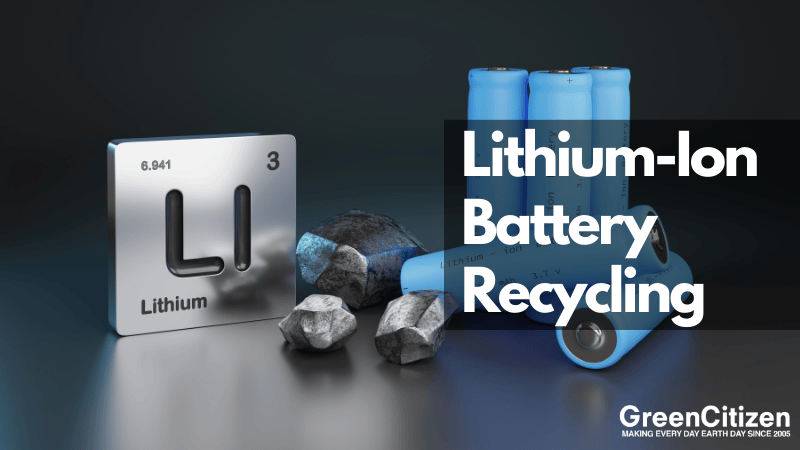Lithium-ion batteries power almost everything around us—from smartphones to electric vehicles—but what happens when these powerful energy sources reach the end of their life? Most people are unaware of the hidden dangers they pose when improperly disposed of.
Toxic chemicals, environmental contamination, and fire hazards are just a few of the risks lurking in your old, forgotten batteries. But the impact goes beyond individual safety—our growing reliance on lithium and cobalt has profound environmental and ethical consequences.
In this blog, we’ll explore the critical need for lithium-ion battery recycling, how to identify damaged batteries, and what you can do to ensure safe, responsible disposal.
Key Takeaway: Lithium-Ion Battery Recycling
Yes, lithium-ion batteries are recyclable—but not in household bins. These batteries pose fire and pollution risks and must be taken to certified recycling centers. Proper disposal recovers valuable metals like lithium and cobalt, prevents groundwater contamination, and reduces toxic waste. Always tape terminals, avoid trashing them, and use drop-off or takeback programs for safe recycling.
Note: GreenCitizen cannot currently accept any loose batteries not installed in electronics due to hazards associated with handling and storage.
Can You Recycle Lithium-Ion Batteries?
Yes, you can recycle lithium-ion batteries, but they require special handling. Take them to certified recycling centers, electronics retailers with battery takeback programs, or hazardous waste collection sites. Avoid throwing them in the trash, as they pose fire risks and contain harmful chemicals. Proper recycling helps recover valuable materials like lithium, cobalt, and nickel while protecting the environment.
The lithium-ion battery recycling process is more complex than other types of e-waste. This complexity can make it challenging to find local recycling centers equipped to handle them.
Unlike paper or plastic, lithium-ion batteries can pose a significant fire risk if damaged or improperly handled due to its reactivity. If they’re mixed with regular recyclables, they can heat up or spark, leading to dangerous situations. This is why they need special care during recycling.
Lithium-ion batteries contain valuable materials like cobalt, nickel, and lithium. Recycling these materials helps reduce the need for new mining operations, which is both environmentally and economically beneficial.
How Much of a Lithium-Ion Battery Can Be Recycled?

While not every part of a lithium-ion battery is recoverable, most of the materials can be recycled. Over 90% of metals like cobalt and nickel can be reclaimed, though certain components, such as plastics and organic chemicals, are harder to recycle.
Recycling methods are continuously improving. One notable method is the hydrometallurgical process, which uses chemical reactions to recover valuable metals like lithium, cobalt, and nickel more efficiently. Researchers are also exploring direct recycling techniques that can restore battery materials to their original state, further increasing recycling rates and reducing the environmental impact.
Keep in mind that lithium-ion batteries can’t be recycled indefinitely. Recovered metals can go through multiple recycling cycles, but each cycle may reduce the purity of the material. Scientists are actively exploring ways to make the recycling process more sustainable.

Read More:
What to Avoid When Disposing of Lithium-Ion Batteries
Remember that you should never throw lithium-ion batteries in the trash. If they end up in landfills, they can leak harmful chemicals like lithium salts and cobalt, or even start underground fires, which are difficult to control and dangerous for the environment.
Always take your batteries to certified recycling facilities. These locations are equipped to handle lithium-ion batteries safely, minimizing the risk of fires or chemical releases.
Recycling lithium-ion batteries prevents environmental harm and supports the circular economy by reducing the need for raw materials. As manufacturers develop safer, more eco-friendly battery alternatives, we expect to see even better recycling technologies emerge in the coming years.
Harmful Metals in Lithium-Ion Batteries
There’s a common misconception about the environmental impact of lithium-ion batteries. While some studies claim lithium is one of the least toxic metals used in battery production, this doesn’t tell the full story. Many other materials in these batteries can cause significant harm to the environment.
What’s Inside a Lithium-Ion Battery?
Lithium-ion batteries are made up of a mix of materials, and while the exact composition varies by manufacturer, a typical battery contains:
- 5-20% cobalt
- 5-10% nickel
- 5-7% lithium
- 15% organic chemicals
- 7% plastics
Environmental Risks of Harmful Metals
While lithium itself is considered less toxic, metals like cobalt, nickel, and manganese found in lithium-ion batteries can pose serious environmental hazards:
- Cobalt and nickel can contaminate soil and water when they break down in landfills.
- Manganese can be harmful to wildlife and ecosystems even in small amounts.
- Plastics and organic chemicals in batteries do not degrade easily and can release toxins into the environment.
The Dangers of Dumping Lithium-Ion Batteries in Landfills

Human Toxicity from Damage and Deterioration
Before lithium-ion batteries even reach landfills, they already pose a toxic threat. When damaged, these rechargeable batteries can release fine particles—known as PM10 and PM2.5—into the air. These tiny particles, less than 10 and 2.5 microns in size, are especially dangerous because they carry metals like arsenic, cadmium, and cobalt.
Breathing in these particles can lead to serious health issues such as heart and lung diseases, increased cancer risks, and hormonal imbalances.
Additionally, damaged or deteriorating lithium-ion batteries can emit hydrofluoric acid (HF), a highly toxic gas that can penetrate the skin or lungs, causing severe health effects. For example, a single electric vehicle battery pack can release significant amounts of HF if damaged—between 20 and 200 mg per watt of battery capacity. To put this into perspective, this amount can easily exceed safety levels set by the US National Institute for Occupational Safety and Health (NIOSH).
Note: Never attempt to disassemble a lithium-ion battery yourself. Leave this to professionals who specialize in battery recycling and are equipped to handle such hazards safely.
Potential Fire Hazard
Proper disposal is also important because lithium-ion batteries can pose a fire hazard when handled or stored improperly. At GreenCitizen, over 95% of the exploded or bulging batteries that we get are from Apple products that use the Lithium Polymer (LiPo) style.
Some of us still remember the Samsung Galaxy Note 7 recall when improperly designed li-ion batteries were prone to overheating and exploding. This effect is called the thermal runoff — a lithium cell basically self-heats, bulges, and combusts.
The problem is not going away by itself.
Veolia, one of the global waste handling companies has noted a 38% increase in fire incidents since 2017, due to the presence of lithium-ion batteries in the waste stream.
The UK Environmental Services Association estimates that nearly 250 fires in the country’s waste treatment centers were caused by small Li-ion batteries between 2019 and 2020.
The German Steel Recyclers Conferedation (BDSV) has reported a whopping 90% of fires at their associated sites in 2020 caused by Li-ion batteries.
But how can this happen?
If a charged lithium cell is crushed or pierced, it will short-circuit which also causes thermal runoff that leads to combustion or explosion.
This is one of the great challenges in lithium-ion battery recycling. You need to do it safely, because setting fire to all the materials you want to recycle is not the best way of recycling.
Groundwater Contamination Concerns
When lithium-ion batteries end up in landfills, they can create a toxic liquid called leachate, which forms when rainwater filters through waste. This leachate carries harmful chemicals and battery materials from the batteries, which can seep into the soil and contaminate groundwater.
The pollutants include heavy metals, electrolyte byproducts, and acidic gasses like HF (hydrofluoric acid), HCl (hydrochloric acid), and SO2 (sulfur dioxide).
Not only do these chemicals poison water sources, but they can also acidify the water, harming local ecosystems in a way similar to acid rain. This damage impacts plant and animal life, often leading to long-term ecological consequences.
Inappropriate battery disposal of lithium-ion batteries discarded in landfills can cause profound and lasting environmental damage. That’s why it’s so important to manage these batteries responsibly by ensuring they go through a proper recycling process. Doing so not only protects human health and reduces fire risks but also safeguards our groundwater and ecosystems from contamination.
The Hidden Costs of Lithium and Cobalt Mining
While lithium-ion batteries are crucial for powering everything from cell phones to electric vehicles, the extraction of key battery components like lithium and cobalt comes with significant environmental and ethical costs.
Understanding the impact of mining these critical materials helps explain why recycling lithium-ion batteries is so important for sustainability.
Environmental Impact of Lithium Mining
Lithium, often referred to as “white gold,” is primarily mined from salt flats in countries like Chile, Argentina, and Bolivia. These salt flats, known as the Lithium Triangle, hold over half of the world’s lithium supply.
However, extracting lithium is highly energy-intensive and comes with several environmental challenges:
- Water Consumption: Extracting lithium from salt flats involves pumping large amounts of groundwater to the surface, which evaporates and leaves lithium behind. This process can use up to 500,000 gallons of water per metric ton of lithium, leading to water scarcity in regions already prone to drought.
- Impact on Local Ecosystems: The diversion of water can deplete local freshwater sources, impacting indigenous communities and wildlife. In the Atacama Desert, for example, lithium mining has led to the depletion of groundwater, affecting farming and local biodiversity.
- Soil and Water Contamination: Chemicals used in lithium extraction, such as hydrochloric acid, can contaminate surrounding soil and water, leading to long-term damage to local ecosystems.
Ethical Concerns in Cobalt Mining
Cobalt is another critical material in lithium-ion batteries, with more than 70% of the world’s cobalt supply mined in the Democratic Republic of Congo (DRC). While cobalt is essential for battery stability and energy density, its extraction is marred by ethical issues:
- Child Labor and Poor Working Conditions: The cobalt mining industry in the DRC has been linked to child labor and dangerous working conditions. Many miners work in small-scale or artisanal mines, often without proper safety gear, leading to frequent accidents and exposure to toxic materials.
- Health Risks: Miners are exposed to cobalt dust, which can cause serious respiratory problems and long-term health complications. Communities living near cobalt mines also suffer from contaminated water and poor air quality, exacerbating health disparities.
- Human Rights Violations: Widespread human rights abuses, including exploitative labor practices and the lack of fair wages, plague the cobalt mining industry. This has led to growing calls for ethically sourced cobalt and greater transparency in the battery supply chain.
How to Tell If Your Lithium-ion Battery Is Bad/Damaged?

Identifying a faulty or damaged lithium-ion (Li-ion) battery is crucial for safety and device performance. Here are signs and tests backed by data and expert guidance to help you determine the health of your Li-ion battery:
1. Visual Inspection
A battery that appears swollen or has a bloated casing is a clear indicator of damage. Swelling can be caused by gas buildup due to overcharging, deep discharging, or internal short circuit. This is a common issue; for instance, many Apple users have complained about the issue of battery swelling. Any discoloration or warping of the battery case could signify overheating, which is a serious concern.
2. Battery Performance Decline
If your battery drains more quickly than it used to, it’s often a sign of degradation. A study published by Battery University indicates that after 300-500 full charge-discharge cycles, Li-ion batteries typically retain only about 70% of their original capacity.
If the battery doesn’t hold a charge at all or drops charge rapidly, it’s likely compromised. Research shows that high temperatures can accelerate degradation, with every 15°F increase—over 77°F room temperature—cutting the battery’s life in half.
3. Voltage Testing
A simple voltage test with a multimeter can reveal if a battery is still functioning or needs to be replaced. Most lithium-ion batteries charge up to 4.2 volts but operate around 3.7 volts during use. When the voltage drops below 3.4 volts, the battery is nearing the end of its life. If it falls under 3.0 volts, the battery is likely damaged and should be recycled.
4. Overheating During Charging or Use
A battery that becomes excessively hot during charging or normal use is a potential safety hazard. Heat can indicate internal resistance, which often leads to battery failure. The acceptable operating range for most lithium-ion batteries is between 59°F and 95°F. Anything outside of this range, particularly if the battery becomes too hot to touch, is a warning sign that it should be replaced.
5. Leakage or Odor
Any leaking fluid or a chemical odor coming from the battery suggests a breach in the battery’s internal structure, which can be extremely dangerous. A leaking battery may release toxic chemicals, which pose a health risk and should be handled with care.
6. Diagnostic Tools
Many modern devices include software that can report on battery health. For instance, Apple’s iOS allows users to check their battery’s maximum capacity and overall health compared to when it was new. Similarly, some protective cases and diagnostic tools offer insights into battery cycles and performance, providing an easy way to identify when a battery is nearing the end of its useful life.
7. Manufacturer Recalls
Stay informed about any battery recalls from your device manufacturer. For example, the Samsung Galaxy Note 7 was recalled due to a widespread battery overheating issue. If you’re unsure about your battery’s health and it matches the recall criteria, it’s essential to act promptly.
How To Recycle Lithium-Ion Batteries
Recycling lithium-ion batteries is crucial for environmental protection and resource conservation. Follow these steps to ensure safe and responsible recycling:
Find a Recycling Center
Lithium-ion batteries require special handling, so it’s important to find a qualified facility. Here’s how to locate one:
- Use Recycling Directories: You can use a Green Directory to find nearby recycling centers that are equipped to handle lithium-ion batteries. These centers have professionals and the right equipment to recycle damaged or dead batteries safely.
- Retail Drop-off Programs: Some electronics stores and big-box retailers offer battery recycling bins. These are often free, making it easy to drop off old batteries.
- Manufacturer Take-back Programs: Check if your device's manufacturer offers a battery take-back service. Many companies now have their own recycling initiatives.
Prepare Your Batteries for Recycling
Proper preparation helps ensure that your batteries can be safely transported and recycled.
Use non-conductive tape to cover the terminals of each battery, or place them in separate plastic bags. This prevents short-circuiting, which could cause a fire.
When transporting batteries, keep them at a moderate temperature and away from any flammable materials. Always handle damaged batteries with care.
The Battery Recycling Process
Here’s what happens once your batteries reach a recycling facility:
- Disassembly: Professional recyclers disassemble batteries into their component parts. This often involves shredding the batteries to separate the materials.
- Material Separation: Different materials, such as metals and plastics, are separated using methods like hydrometallurgy, pyrometallurgy, or mechanical processes.
- Recovery and Repurposing: Recovered materials like cobalt, lithium, and nickel can be reused to make new batteries or for other industrial applications.
Always follow local environmental regulations when recycling batteries. This helps ensure that the materials are handled responsibly and that no harmful substances end up in landfills.
Dos And Don’ts When Recycling Lithium-Ion Batteries
- Whenever possible, remove the battery from the device.
- If the batteries are physically damaged, store them in an insulated plastic bag to avoid any short-circuiting.
- Keep them in a cool and dry place to avoid combustion.
- Bring them to a certified recycling provider who can safely deal with the hazardous materials they may potentially contain.
- Contact their manufacturer to see if there is an industry collection program for them.
- Never dump used batteries into your regular waste.
- Don't crush or pierce the batteries as this can lead to leakage or short-circuiting.
- Don't store large quantities of li-ion batteries close together without capping or taping off exposed connectors.
- Never throw li-ion batteries in the regular blue recycling bin.
- Don't keep old batteries close to flammable materials.
Frequently Asked Questions (FAQ)
Lithium-ion batteries are not necessarily bad for the environment; it’s the metals in them that are, especially if one of those metals is cobalt. If they don’t go through proper recycling processes, then metals like cobalt and nickel can leak into the ground and cause groundwater pollution.
When lithium-ion batteries die, the process that allows for ions to pass back and forth between electrodes slows down. This means that less energy can be stored, and you’ll ultimately run out of power when you need it the most.
Lithium-ion batteries typically last about three years or 300 to 500 charge cycles before they get to a stage where they will no longer retain much energy.
Conclusion
Lithium-ion batteries are insanely useful, but it’s important that you don’t unknowingly put yourself or others in danger because of them.
The fire hazards associated with them and the toxic metals that they contain could potentially lead to serious issues unless these batteries are properly recycled.
If you would like to recycle lithium-ion batteries, you can visit the Green Directory to find battery recycling drop-off centers near you.
We thank you for doing your part for the environment!

